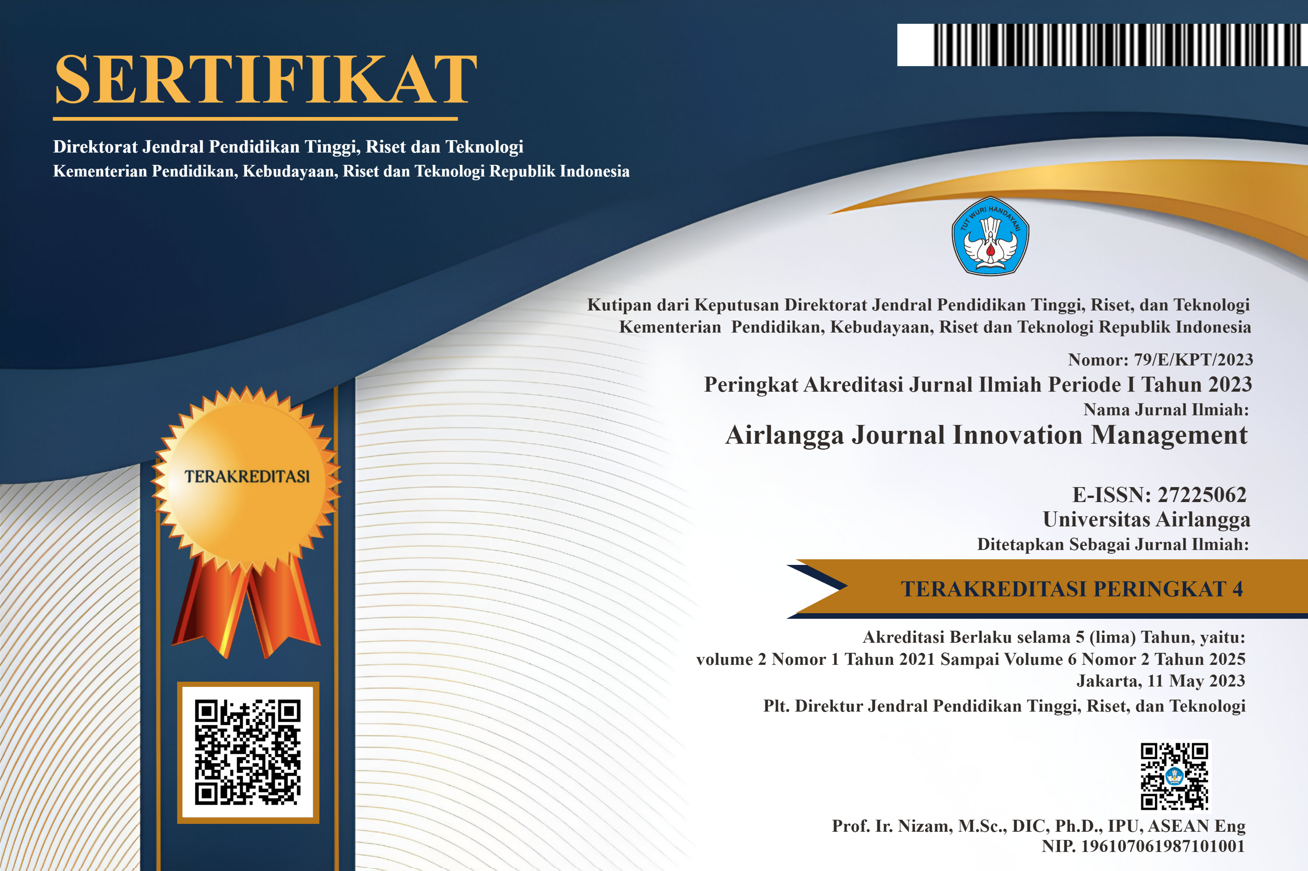Determinants Influencing QRIS Adoption as a Digital Payment Tool in Ciledug, Tangerang City
Downloads
This study aims to determine the effect of perceived usefulness, perceived trust, and community preferences on decisions to use QRIS in Ciledug sub-district, Tangerang City. This study uses quantitative methods with a causality approach, and the sampling technique is purposive sampling with a sample size of 100 people. The findings show, that the t-test results of perceived usefulness have a t-count value of 1.159 with Sig 0.249> 0.05, which means there is no significant influence between perceived usefulness and the decision to use QRIS. Furthermore, perceived trust with a t-count value of 2.218 with Sig 0.029 0.05, means that there is a significant influence on trust preferences in using QRIS. Then people's preferences obtained a t-count value of 1.842 with Sig 0.069> 0.05, which means there is no effect of people's preferences on using QRIS as a digital payment tool. While simultaneously there is a significant influence between perceived usefulness, perceived confidence, and community preferences on the decision to use QRIS. This means that the level of influence of each variable studied is still low. This research could become a reference for the Ciledug community, especially for local leaders and banks to increase public interest in to use of QRIS as a digital payment tool.
Agustia, V. L., & Haryatiningsih, R. (2024). Analisis Preferensi Komuter terhadap Pilihan Moda Transportasi Bandung Raya. Jurnal Riset Ilmu Ekonomi Dan Bisnis, 97–108.
Al-Fahim, N. H., Ateeq, A. A., Abro, Z., Milhem, M., Alzoraiki, M., Alkadash, T. M., & Nagi, M. (2024). Factors influencing the mobile banking usage: Mediating role of perceived usefulness. In Digital technology and changing roles in managerial and financial accounting: Theoretical knowledge and practical application (Vol. 36, pp. 115–128). Emerald Publishing Limited.
Alfani, R. S., & Ariani, K. R. (2024). Pengaruh Persepsi Manfaat, Persepsi Kemudahan, Risiko Dan Kepercayaan Terhadap Keputusan Menggunakan Uang Elektronik (Qris). Jurnal Ilmiah Edunomika, 8(1).
Al-shanableh, N., Alzyoud, M., Alomar, S., Kilani, Y., Nashnush, E., Al-Hawary, S., & Al-Momani, A. (2024). The adoption of big data analytics in Jordanian SMEs: An extended technology organization environment framework with diffusion of innovation and perceived usefulness. International Journal of Data and Network Science, 8(2).
Ambarwati, D. (2019). Pengaruh Persepsi Manfaat, Persepsi Kemudahan dan Persepsi Kepercayaan Terhadap Keputusan Penggunaan Go-Pay Pada Mahasiswa Stie Aub Surakarta. Jurnal Bisnis Dan Ekonomi, 6(1), 88–103.
Amelia, E., Pasca, Y. D., Abriyani, L., Hasanah, A. S., Pratiwi, V. A., Susnita, T. A., & Sari, G. K. (2024). Optimizing Employee Performance: The Role of Public Service Motivation and Organizational Citizenship Behavior. Airlangga Journal of Innovation Management, 5(4), 651–665. https://doi.org/10.20473/ajim.v5i4.63768
Aminda, R. S., Nani, M. B., Trisniani, S., Amintara, D. N., Suci, J. P. B., Nidzomi, S. A., & Arsyad, B. K. (2024). Pengaruh Preferensi Konsumen Terhadap Keputusan Membeli Pada Kelas Layanan Kereta Api Melalui Aplikasi KAI Access. Diversity: Jurnal Ilmiah Pascasarjana, 4(1), 16–26.
Booyse, D., & Scheepers, C. B. (2024). Barriers to adopting automated organisational decision-making through the use of artificial intelligence. Management Research Review, 47(1), 64–85.
DP, S. A., & Kristian, A. (2024). Dampak persepsi manfaat, persepsi resiko dan kepercayaan terhadap keputusan melakukan transaksi pada bank pt. Bpr bkk kota tegal (perseroda). E-Logis: Jurnal Ekonomi Logistik, 7(2), 119–135.
Efendi, B., Ekasari, S., Sani, I., Wakhidah, E. N., & Munizu, M. (2024). Analysis of the Influence Of Behavioral Intention, Perceived Ease Of Use And Perceived Usefulness On Actual Usage Of Digital Wallet Customers. JEMSI (Jurnal Ekonomi, Manajemen, Dan Akuntansi), 10(1), 209–214.
Fathi, K. A., & Wandebori, H. (2024). Investigation Of Behavioral Intention to Use Digital Payment System In Indonesia From Merchant And Consumer Perspective (Case Study: Qris). Jurnal Apresiasi Ekonomi, 12(2), 309–325.
Hair, J., Hult, T. J., Ringle, C., & Sarstedt, M. (2022). A primer on partial least squares structural equation modeling (PLS-SEM) (Third editon). SAGE Publications Ltd. http://www.tandfonline.com/doi/abs/10.1080/1743727X.2015.1005806
Hasibuan, A. N., Fadhillah, A., & Joko Setyono, W. (2024). Determinant of Intention to Use the Quick Response Code Indonesian Standard at Indonesian Sharia Bank. Journal of Hunan University Natural Sciences, 51(8).
Himawati, D., & Firdaus, M. F. (2021). Pengaruh Word of Mouth dan Manfaat Terhadap Keputusan Menggunakan E-Wallet Dana Melalui Kepercayaan Pelanggan di Jabodetabek. INOBIS: Jurnal Inovasi Bisnis dan Manajemen Indonesia, 4(3), 424–436. https://doi.org/10.31842/jurnalinobis.v4i3.194
Ichwan, A., & Ghofur, R. A. (2020). Pengaruh Technology Acceptance Model Terhadap Keputusan Muzakki Membayar Zakat Melalui Fintech Gopay. Jurnal Ilmiah Ekonomi Islam, 6(2), 129–135. https://doi.org/10.29040/jiei.v6i2.1011
Jusman, J., & Fauziah, I. (2024). Receptiveness of qris as a digital payment among msme in palopo city. Interdiciplinary Journal & Hummanity (INJURITY), 3(10).
Kurniawati, E. T., Zuhroh, I., & Malik, N. (2021). Literasi dan Edukasi Pembayaran Non Tunai Melalui Aplikasi QR Code Indonesian Standard (QRIS) Pada Kelompok Milenial. Studi Kasus Inovasi Ekonomi, 5(1), 23–30.
Lestari, A. A., & Jatmika, S. (2024). Preferences for Using the Quick Response Code Indonesia Standard (QRIS) Payment Method for Accounting Education Students at Universitas Muhammadiyah Surakarta. Indonesian Interdisciplinary Journal of Sharia Economics (IIJSE), 7(3), 8187–8203.
Lestari, N. F., & Ramadhan, F. (2024). Pengaruh Persepsi Manfaat Dan Persepsi Kemudahan Penggunaan Terhadap Keputusan Menggunakan Teknologi Qris. Stratēgo: Jurnal Manajemen Modern, 6(4).
Manupassa, D. F., Lapian, S. L. J., & Gunawan, E. M. (2025). Pengaruh persepsi manfaat, persepsi kemudahan dan e-trust terhadap keputusan pembelian ulang tiket bioskop pada pengguna aplikasi tix id di kota manado. Jurnal EMBA: Jurnal Riset Ekonomi, Manajemen, Bisnis Dan Akuntansi, 13(01), 134–145.
Megaranto, A., & Madi, R. A. (2025). Persepsi manfaat, risiko, dan kepercayaan sebagai determinan keputusan penggunaan financial technology. HOMANIS: Jurnal Halu Oleo Manajemen Dan Bisnis, 2(1), 18–29.
Musriani, M., & Sanaba, H. F. (2024). Preferences of Traditional Market Traders in Deciding to Use Quick Response Code Indonesia Standard (QRIS) as a Transaction Tool. Jurnal Manajemen Bisnis, 11(2), 1463–1471.
Nasih, A. M. N., Gati, V., & Rahayu, S. (2024). Pengaruh Persepsi Kemudahan Penggunaan, Persepsi Manfaat, Persepsi Kepercayaan, Persepsi Risiko Dan Persepsi Hambatan Terhadap Minat Menggunakan QRIS yang Dimediasi Oleh Sikap Terhadap QRIS. Jurnal Akuntansi AKUNESA, 12(3), 302–316.
Nasution, L. N., Rangkuty, D. M., & Putra, S. M. (2024). The Digital Payment System: How Does It Impact Indonesia’s Poverty? ABAC Journal, 44(3), 228–242.
Natalina, S. A., Zunaidi, A., & Rahmah, R. (2021). Quick response code indonesia standard (qris) sebagai strategi survive usaha mikro kecil dan menengah (umkm) di masa pandemi di kota kediri. Istithmar : Jurnal Studi Ekonomi Syariah, 5(2). https://doi.org/10.30762/istithmar.v5i2.85
Novitasari, M., & Taufiq, M. (2020). Pengaruh Financial Technology Knowledge dan Preferensi Transaksi Non Tunai Terhadap Keputusan Menggunakan Produk Jasa Perbankan. 3(1), 50–60.
Nugrahaningrum, K. F., & Raharja, E. (2024). The effect of perception of benefits, ease of use, trust on the decision to use QRIS with attitude as an intervening variable. 2(1), 82–91.
Nurqamarani, A. S., Fadilla, S., & Juliana, A. (2024). Revolutionizing Payment Systems: The Integration of TRAM and Trust in QRIS Adoption for Micro, Small, and Medium Enterprises in Indonesia. Journal of Information Systems Engineering & Business Intelligence, 10(3).
Pakkawaru, I., & Moharom, M. S. (2024). The impact of GENBI SUL-TENG’s socialization and implementation on Islamic Economics students’ QRIS payment preference. Jurnal Ilmu Perbankan Dan Keuangan Syariah, 6(1), 87–100.
Pratiwi, A. (2022). The effectiveness of the implementation of the indonesian standard quick response payment system (QRIS) on MSMEs in Banten. Review of Accounting and Taxation, 1(02), 93–99.
Prawitasari, D., Badiani, F. D., Rachmawati, S. D., Ningrum, F. P., & Mufidah, N. L. (2024). QRIS in indonesia: A comprehensive literature review on adoption, challenges, and opportunities. Revenue: Jurnal Manajemen Bisnis Islam, 5(1), 91–102.
Rachman, A., Julianti, N., & Arkoyah, S. (2024). Challenges and Opportunities for QRIS Implementation as a Digital Payment System in Indonesia. EkBis: Jurnal Ekonomi dan Bisnis, 8(1), 1–13.
Rafika, S., Hasibuan, A. Q. R., & Gusteti, Y. (2024). The Effect of Trust, Promotion, and Service Quality on the Decision to Use the Ollin Application. UPI YPTK Journal of Business and Economics, 9(3), 37–45.
Rahmawati, F., & Merlinda, S. (2024). The Effect of Perceived Benefits, Ease of Use, and Risk on Culinary MSMEs’ Interest in Utilizing QRIS. Journal of Business & Banking, 14(1).
Ramadhan, U. K. (2021). Pengaruh Kepercayaan, Kemudahan, Keamanan, Transparansi Terhadap Keputusan Donatur dan Muzaki Dalam Membayar Zakat, Infak, Sedekah Melalui Platform E-wallet. 6.
Ramayanti, R. (2024). Understanding User Perceptions of QRIS in Indonesia: Exploring the Impact of Perceived Usefulness, Ease of Use, and Demographic Factors. International Journal of Finance & Banking Studies, 13(4).
Ranjan, R. (2025). Behavioural Finance in Banking and Management: A Study on the Trends and Challenges in the Banking Industry. Asian Journal of Economics, Business and Accounting, 25(1), 374–386.
Rifai, D. F., & Halim, A. (2020). Preferensi Masyarakat Di Kota Makassar Dalam Menggunakan E-money Fintech Sebagai Alat Pembayaran Elektronik. SEIKO : Journal of Management & Business, 3(3), 202–213.
Rohmawati, D. I., & Disastra, G. M. (2024). Faktor-faktor yang mempengaruhi preferensi konsumen terhadap keputusan pembelian di website k24klik. Com apotek k24 cikijing tahun 2024. Jurnal Lentera Bisnis, 13(2), 977–988.
Safari, A., Riyanti, A., Alfiana, A., Astuti, N., & Ristati, R. (2024). Education on the Use Of Qris As A Payment Tool To Increase The Productivity Of Msmes In Rural Communities. Journal Of Human and Education (JAHE), 4(1), 539–544.
Safitri, A., Sari, R. N., Zenita, R., & Khoiriyah, M. (2024). The effect of the use of social media, digital payments (qris) and digital marketing on msme performance. 1(1, Januari), 126–138.
Sari, D. K., Maulidyah, N. L., & Nugroho, T. T. (2024). The Effect of Lifestyle, Consumer Trust, and Perceived Value on Purchase Intention of Thrift Shop in Sidoarjo. Airlangga Journal of Innovation Management, 5(2), 306–320. https://doi.org/10.20473/ajim.v5i2.57719
Saripudin, S., Yuniarti, R., & Ernawati, D. (2023). Exploring the Factors Influencing the Adoption of QRIS as a Digital Payment in Indonesia. The Journal of Management Theory and Practice (JMTP), 4(1), 53–59.
Sekarsari, K. A. D., Indrawati, C. D. S., & Subarno, A. (2021). Optimalisasi penerapan quick response code indonesia standard (qris) pada merchant di wilayah surakarta. Jurnal Informasi Dan Komunikasi Administrasi Perkantoran, 5(2), 42–57.
Septianda, T., & Priantina, A. (2024). Gen Z and Halal Local Cosmetics. Airlangga Journal of Innovation Management, 5(2), 201–214. https://doi.org/10.20473/ajim.v5i2.56338
Sholihin, I., Agustin, H., & Dimyati, M. (2024). The Influence of Perceived Benefits, Trust, and Ease of Use on the Interest of MSMEs in Using the QRIS Payment System in Jember Regency. ARTOKULO: Journal of Accounting, Economic and Management, 1(3), 325–332.
Siti Khofsoh. (2020). Pengaruh Persepsi Kemudahan, Persepsi Manfaat, Motivasi Hedonis, Kebiasaan, Promosi Penjualan Terhadao Niat Menggunakan dan Perilaku Konsumen Dalam Menggunakan Dompet Digital. Journal of Management and Accounting.
Sugiyono. (2017). Metode Penelitian Kuantitatif, Kualitatif, dan R&D. Alfabeta.
Trianto, B., Nik Azman, N. H., & Masrizal, M. (2025). E-payment adoption and utilization among micro-entrepreneurs: A comparative analysis between Indonesia and Malaysia. Journal of Science and Technology Policy Management, 16(2), 314–343.
Windani, I., & Awaliyah, S. K. (2020). Preferensi Konsumen Terhadap Pangan Organik Di Indonesia. Seminar Nasional …, 622–633.
Yuldinawati, L. (2024). The Use of E-commerce and QRIS as Digital Payment Solutions to Enhance Sales Performance in MSMEs in West Java. Indonesian Interdisciplinary Journal of Sharia Economics (IIJSE), 8(1), 1157–1178.
Copyright (c) 2025 Airlangga Journal of Innovation Management

This work is licensed under a Creative Commons Attribution-NonCommercial-ShareAlike 4.0 International License.
- The journal allows authors to hold copyright without restrictions and retain publication rights without restrictions. The author retains the copyright and grants the first publication rights to the journal, with his work simultaneously licensed under the Creative Commons Attribution-NonCommercial-ShareAlike 4.0 International License (CC BY-NC-SA). This license allows others to share the work with acknowledgment of authorship and initial publication in this journal, provided that the work is not used for commercial purposes and that any derivative works must use the same license.
- Authors may enter into additional contractual agreements for non-exclusive distribution of the journal publication version (e.g., uploading it to an institutional repository or publishing it in book form), while still including acknowledgment of the initial publication in this journal.
- Authors are allowed and encouraged to upload their work online (e.g., in an institutional repository or personal website) before and during the submission process. This can support productive scientific exchanges as well as increase citations to published works.

AJIM by UNAIR is licensed under a Creative Commons Attribution-NonCommercial-ShareAlike 4.0 International License.





















